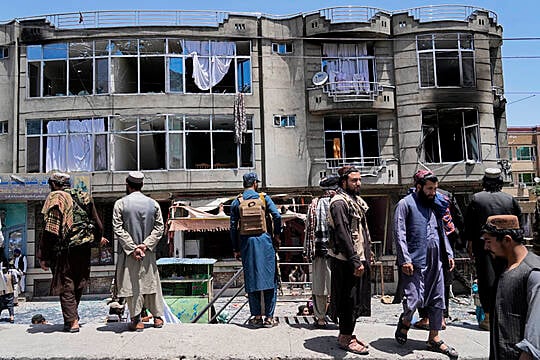Explosions and gunfire have ripped through a Sikh temple in Afghanistan’s capital, killing one worshipper and wounding seven others, a Taliban official said.
Gunmen attacked the Sikh house of worship, known as a gurdwara, in Kabul and a gun battle between the attackers and Taliban fighters ensued, said Abdul Nafi Takor, a Taliban-appointed spokesperson for the Interior Ministry.
He said a vehicle full of explosives was detonated outside the temple but that resulted in no casualties. “First the gunmen threw a hand grenade which caused a fire near the gate,” he said.
Khalid Zadran, a spokesman for the Kabul police chief, said the police operation ended after the last attacker was killed several hours later. He did not say how many attackers were involved.

Mr Zadran said one Sikh was killed and seven others were wounded in the attack and a Taliban security officer was killed during the rescue operation.
“The security forces were able to act quickly to control the attack and eliminate the attackers in a short period of time to prevent further casualties,” he said.
Videos posted on social media showed plumes of black smoke rising from the temple in Kabul’s Bagh-e Bala neighbourhood and gunfire can be heard.
A regional affiliate of the Islamic State group known as the Islamic State in Khorasan Province has recently increased attacks on mosques and minorities across the country.
The IS affiliate, which has been operating in Afghanistan since 2014, is seen as the greatest security challenge facing the country’s Taliban rulers.

Since seizing power in Kabul and elsewhere in the country last August, the Taliban have launched a sweeping crackdown against the IS in eastern Afghanistan.
In March 2020, a lone Islamic State gunman rampaged through a Sikh temple in Kabul, killing 25 worshippers, including a child, and wounding eight others.
As many as 80 worshippers were trapped inside the gurdwara as the gunman lobbed grenades and fired an automatic rifle into the crowd.
There were less than 700 Sikhs and Hindus in Afghanistan at the time of the 2020 attack. Since then, dozens of families have left but many cannot financially afford to move and have remained in Afghanistan, mainly in Kabul, Jalalabad and Ghazni.







